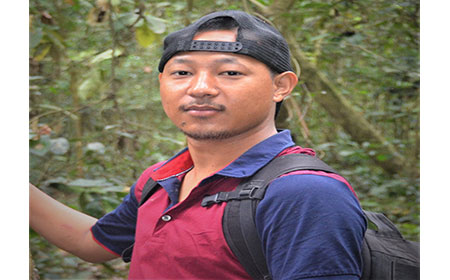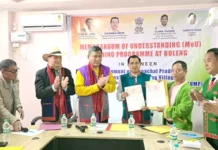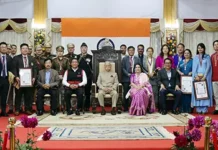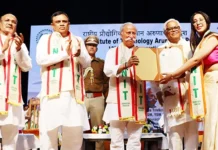[ Kino Pader ]
As grandchildren of proud Nyishi hunters, we never thought much about the beauty of having wildlife. But now we do.
My interest grew when I realized the value of doing wildlife conservation in my own backyard. As a nature lover, my village, Darlong, which is adjacent to the Pakke Tiger Reserve (PTR), offers me the experience of going into this globally important wilderness. I firmly believe that ‘spontaneous kindness is more powerful than a gun.’ Perhaps this is why I love to shoot with my camera, rather than picking up a gun. So, when I go to Pakke, my bags are filled with camera gear.
In a relatively short span of time, Pakke has earned glory and fame through THE hard work of many people on the ground. Our Pakke is now a beacon of hope for wildlife protection and conservation for every rural area in Arunachal. Pakke helps our local economy in terms of tourism and job opportunities, and has other intangible values which are hard to find in urban places.
The PTR has many species and unique biological processes in a relatively small area of 862 sq kmS. It is home to 40 recorded mammal species, including three large cats (tiger, leopard and clouded leopard) and smaller carnivores. People who visit Pakke and are interested in bird-watching will not be disappointed. We have four hornbill species – the great hornbill, the wreathed hornbill, the oriental pied hornbill, and the rufous-necked hornbill – which are the pride of Pakke.
Many migratory birds also visit Pakke. We have 296 bird species, 350 butterfly species, and 66 species of reptiles and amphibians, and they live among the 1500 plant species that are likely to be found in Pakke. But it has been a struggle protecting this paradise, and it seems like it will never be easy.
Now our Pakke is being threatened by the East-West Industrial Corridor project, with proposes to lay a 50-km road through the heart of the reserve. Today, if my proud elders lived, they would say, “I would rather walk a 100 miles on foot, instead of destroying the beauty of Pakke – and that, too, just to save a mere distance of 26 kms on a vehicle.”
This project will not only destroy the habitats of wild animals but also increase the chances of collapse of wildlife populations across their regional range, given Pakke’s importance to the overall landscape. Moreover, human-wildlife conflicts are most likely to increase if this road is constructed.
My big question to the authorities concerned is, what good would it bring if we can’t conserve our environment, our Pakke and our motherly nature? What is the use of celebrating the Pakke-Paga Hornbill Festival every year if we can’t come up with a better option to protect our paradise? Let us not forget that the Rajaji National Park in Uttarakhand is an example of how a road has badly affected the movement of animals and fragmented habitats.
No doubt I want my homeland to have better infrastructure and equipment, but how can we allow development to come at the cost of our identity, the Nyishi pride, and affect the income sources of my own people? It breaks my heart.
We the Nyishis of Pakke have already given up the tradition of hunting and poaching of hornbills and various other wild animals whose parts we once wore as ornaments as part of our tradition. What am I going to tell our younger generations if our Pakke is destroyed? Our Nyishi ancestors worshipped nature, and by conserving Pakke we are serving Mother Nature, our culture and our ancestors. How am I supposed to let them know that we the Nyishi of Pakke were once a proud tribe in conserving our forest land and its wildlife?
My humble request is to please look for other optional routes, rather than cutting through the heart of our Pakke. There is always a way out. In today’s scenario, one cannot forget that conservation of forests and wildlife is also a crucial part of the development of humanity. Former prime minister Indira Gandhi rightly said: “A threat to any species of plant and animal life is a threat to man himself.” (Kino Pader is pursuing MSc in forestry at Manipur University, Imphal, and was born and brought up in Darlong village, near the PTR.)




